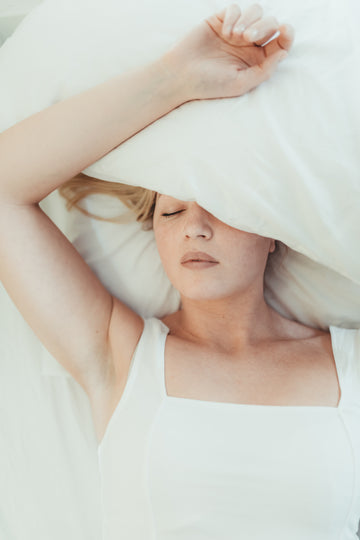education hub
Can Sleep Apnea Be Cured?
on
Nov 17, 2024
Sleep apnea is a serious condition that affects millions of Australians, but the question that often comes up is, “Can sleep apnea be cured?” The answer is a bit more complicated than a simple yes or no. While there is no permanent cure for sleep apnea, the good news is that sleep apnea is highly treatable meaning you can effectively manage the condition, significantly improve quality of life, and even eliminate symptoms in many cases.
At Sleep Mate CPAP, we believe that knowledge is power when it comes to treating sleep apnea. In this post, we’ll go over everything you need to know about sleep apnea, how it’s treated, and whether or not it can be cured. We’ll also answer some of the most frequently asked questions to help you better understand this common condition.

Sleep apnea is a disorder that causes your breathing to stop and start repeatedly while you sleep. There are several different types of sleep apnea, but the most common is obstructive sleep apnea (OSA), which occurs when the muscles at the back of your throat relax too much and block your airway. Other types include central sleep apnea (where your brain doesn't send the right signals to your breathing muscles) and complex sleep apnea (a combination of both obstructive and central sleep apnea).
Common Symptoms of Sleep Apnea
If you experience any of the following symptoms, you may be suffering from sleep apnea:
Loud snoring
Gasping or choking during sleep
Excessive daytime drowsiness
Difficulty concentrating
Morning headaches
Dry mouth or sore throat upon waking
If these sound familiar, it’s important to talk to a healthcare provider and consider getting tested for sleep apnea. Early detection and treatment can make a huge difference in managing your symptoms.
Sleep apnea is highly treatable meaning you can effectivly manage the condition, significantly improve quality of life, and even eliminate symptoms in many cases.
Can Sleep Apnea be Cured?
The Short Answer: There's no cure, but it can be managed.
Currently, there is no cure for sleep apnea, particularly for obstructive sleep apnea (OSA), which is the most common form. However, the condition can be effectively managed with the right treatment. Depending on the severity of your sleep apnea, treatments like CPAP therapy, lifestyle changes, and even surgery can dramatically improve your quality of life and reduce the risk of health complications associated with untreated sleep apnea.
Let’s take a closer look at the most common treatment options available.
CPAP Therapy: The Gold Standard Treatment for Sleep Apnea
Continuous Positive Airway Pressure (CPAP) therapy is the most common and effective treatment for sleep apnea. The CPAP machine uses a hose connected to a CPAP mask or nosepiece to deliver a constant stream of air into your airways while you sleep, preventing the airway from collapsing and ensuring that you breathe easily throughout the night.
Many people find that after starting CPAP therapy, they experience a dramatic improvement in sleep quality, daytime energy levels, and overall health.
How to Get the Most Out of CPAP Therapy
For CPAP therapy to be effective, it’s important to choose the right mask and machine. There are different types of CPAP machines available, including:
Standard CPAP – Delivers a continuous stream of air at a constant pressure.
BiPAP (Bilevel Positive Airway Pressure) – Provides two levels of air pressure: one for inhaling and a lower one for exhaling.
APAP (Automatic Positive Airway Pressure) – Adjusts the air pressure automatically based on your needs throughout the night.
At Sleep Mate CPAP, we offer a wide range of CPAP machines, masks, and accessories to suit your needs, and we provide expert guidance on finding the best fit for you.
Other Treatment Options for Sleep Apnea
Lifestyle Changes
For some people, making certain lifestyle changes can significantly reduce the severity of sleep apnea symptoms. These may include:
Losing weight: Extra weight around the neck area can contribute to airway obstruction.
Avoiding alcohol and sedatives: These substances relax the muscles in the throat, making it harder for your airway to stay open.
Changing sleep positions: Sleeping on your back can exacerbate sleep apnea, so sleeping on your side may help keep the airway open.
Oral Appliances
An alternative to CPAP therapy is an oral appliance (also known as a mandibular advancement device), which works by repositioning the lower jaw and tongue to keep the airway open. This option is more suitable for people with mild to moderate sleep apnea or those who cannot tolerate CPAP therapy.
Surgery
Surgery is typically considered a last resort for those who don’t respond to other treatments. Surgical options include:
Uvulopalatopharyngoplasty (UPPP): This procedure removes excess tissue from the throat to widen the airway.
Genioglossus advancement (GA): A procedure to reposition the jaw and prevent airway collapse.
Weight loss surgery: If obesity is contributing to your sleep apnea, bariatric surgery may help improve symptoms.
Can Sleep Apnea Be Cured Naturally?
What is Sleep Apnea?
Frequently asked questions



